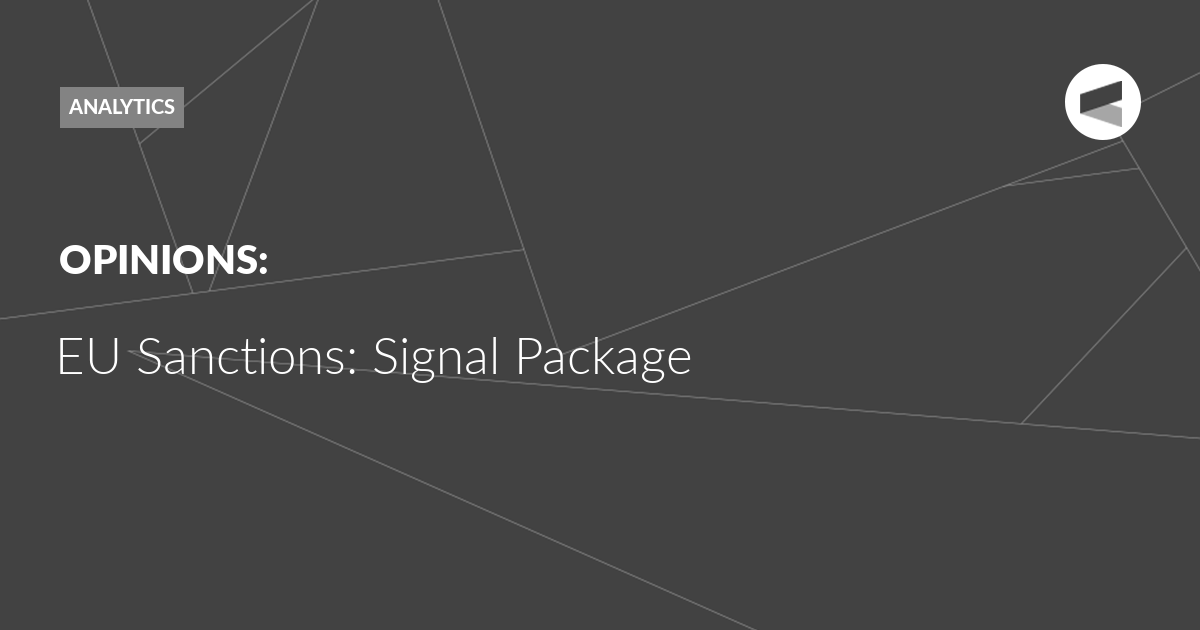At the same time, the US paused the introduction of new sanctions against Russia. In the EU, the approach of the American administration caused understandable indignation, aggravated by Trump’s trade war “with the whole world” and public criticism of democracy in Europe. Demonstrating the independence of its course has apparently become a matter of principle for Brussels. In addition, the usual dissenters – Hungary and Slovakia – were againg expressing dissatisfaction with the results of the Union’s foreign policy on the Ukrainian issue. Their public deviations from the general line had previously had little effect on tightening the policy towards Russia. But given the changes in American policy, even a light Hungarian and Slovak opposition could have had a different resonance. The picture was completed by the successes of right-wing parties in a number of countries, with their sympathies for Trump and scepticism towards the Euro-bureaucracy.
In solving all the problems described, sanctions could serve as a tactical, but at the same time multi-tasking tool. By introducing a new package of restrictive measures, the EU demonstrated that its political course would not fluctuate with the change of administration in Washington. However, on more sensitive issues, such as tariffs, neither Brussels nor individual EU countries challenged Washington. On the Ukrainian issue, sanctions allowed demonstrating commitment to the course of the past three years, but at the same time not stepping on the US toes. The seventeenth package showed that the EU retains the ability to agree on new restrictive measures and adopt them by consensus, that is, with the support of the votes of all member countries. Brussels does not change the rules of the game of foreign policy decision-making and maintains the importance of the voice of all Eurozone countries. The successes of the right do not fundamentally affect foreign policy either.
However, in reality, coordinating the seventeenth package was hardly an excessively difficult task. Strictly speaking, its escalation potential turned out to be quite low. First of all, the list of blocked Russian persons was expanded. Now, Appendix 1 of Regulation 269/2014 includes 1,944 individuals and 600 legal entities (an increase of 17 and 58 units, respectively). These individuals include the heads of defence enterprises or firms implementing contracts in the interests of the military-industrial complex. Among the legal entities, the majority are military-industrial companies and industrial firms. The list includes the Russian energy company Surgutneftegaz. But back in January, it fell under blocking sanctions from the US, so the EU restrictions only added to, but did not fundamentally change, the company’s capabilities on the external contour. Appendix 1 also includes the company Atlas Mining, which is engaged in gold mining. But here too, no qualitative changes are observed – the attack on the gold mining sector is far from a new phenomenon, and larger producers have already fallen under Western sanctions. Among the blocking sanctions, secondary sanctions are noticeable, that is, restrictions on companies from third countries. They affected seven organizations from China (mainly suppliers of industrial equipment), two from the UAE (companies associated with the Russian tanker fleet, according to the EU), one company from Turkey (an importer and intermediary in oil sales), one from Israel (a supplier of electronics), and one from Belarus (a supplier of the Russian military-industrial complex). In general, the EU is still far from the volumes of the United States, but the pace is becoming more noticeable. However, as in the case of the US, the blocked entities mainly include small firms or intermediary companies.
New export control measures have been adopted. But they can hardly be considered revolutionary either. Appendix IV of Regulation 833/2014 has added 31 entities to which supplies of dual-use goods are prohibited and exceptions and exemptions for such supplies do not apply. Among them there are also companies from third countries – six from Turkey, three from Vietnam, two from the UAE, one from Serbia, one from Uzbekistan. Here we are also talking about small and little-known companies, which, apparently, can be replaced by others. The list of dual-use goods prohibited from import to Russia has been expanded. But in comparison with previous packages, the changes are minimal – there is simply nowhere to grow further, given the previously imposed sanctions.
Finally, the list of sea vessels that are prohibited from accessing EU ports, insuring them and other servicing them has been expanded by 189 units. We are talking about tankers that are presumably transporting Russian oil. Earlier, even before Trump came to power, the United States issued equally impressive lists. Therefore, here too, the EU is unlikely to fundamentally change the status quo.
Ultimately, the seventeenth package offers only incremental adjustments to the EU’s sanctions regime. It avoids sectors that would directly impact European producers or consumers, instead reinforcing existing restrictions. While sufficient for signaling resolve, it lacks mechanisms to meaningfully alter Russia’s strategic calculus. The prospect of these measures influencing Moscow’s political decisions remains negligible.
The Valdai Discussion Club was established in 2004. It is named after Lake Valdai, which is located close to Veliky Novgorod, where the Club’s first meeting took place.
Please visit the firm link to site






